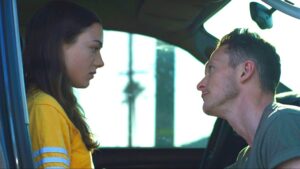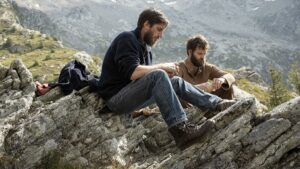Southern California teenagers can be a shallow bunch, especially in the movies that are made about them. From the beginnings of the postwar “youth” film — Rebel Without a Cause (1955) is a touchstone — through the parade of parental nightmares that followed, movie teenagers in L.A.’s sunbaked sprawl have been lured into some pretty skeevy lifestyles with few moral guideposts. Catherine Hardwicke’s Thirteen, released in 2003, starring Holly Hunter as a single mom and Evan Rachel Wood as her wayward teenage daughter, is arguably the nadir of this cautionary genre.
Today, the sex, drugs, and rock ’n’ roll of Thirteen’s turn-of-the-millennium generation has been replaced by the bogeymen of social media. Though in Jamie Dack’s Palm Trees and Power Lines, which premiered at Sundance in 2022 (where Dack won a directing award) and released a year later, it’s not social media that gets 17-year-old Lea (played by Lily McInerny) into an adult-world quagmire, it’s old-fashioned hanging out.

Lea lives somewhere on the fringes of Los Angeles County with her serial-dating divorced mom (Gretchen Mol). In the summer before her senior year of high school, she and her friends have little to do except congregate in living rooms, diners, and parking lots, get high, and have perfunctory sex. Lea is clearly bored and lacks motivation for a job or even summer reading. Her mother mostly leaves her on her own, except when she’s between boyfriends. And her remarried father has a new family that keeps him out of touch.
Then Lea meets Tom, played with utter control and precision by grown-up teen actor Jonathan Tucker. He’s handsome and buff, chivalrous and clean-cut, and most important, he’s twice her age and gives her his total attention. No matter how creepy he might seem to other characters in the movie, to Lea, Tom is irresistible.
Palm Trees and Power Lines, which is available for streaming on AppleTV and a few selected sites, is Dack’s first feature, and it’s quite impressive: beautifully shot, artfully told, and flawlessly performed, especially by McInerny and Tucker. Tom’s M.O. in “grooming” Lea — and her willingness to go along with him — might strain credulity, but Dack makes it work, mostly by avoiding the superficial trappings of sleaze or villainy. The film’s coda (no spoilers here) is similarly outrageous, and equally as smooth. Richard Brody in the New Yorker didn’t buy the vacuousness of Lea and her friends and the film-school gloss of the narrative, but that judgment arises from a New York literati bubble. Teens like Lea are not uncommon, and her plight, as depicted in the movie, is haunting.
The Eight Mountains is another recent film that deals with young people finding their way to adulthood, but it’s set far, far away from Southern California. It’s the epic saga of two boys, Pietro and Bruno, who meet one summer in the 1980s in Grana, a village in the Italian Alps north of Turin. Bruno is the last local child left in Grana, and 11-year-old Pietro and his mother are spending the summer there while his father works in Turin as a factory manager. Bruno, who lives with his aunt and uncle while his single dad works in Switzerland, forms an intimate bond with Pietro and his parents — especially Pietro’s father, who visits Grana toward the end of the season and hikes the mountains with both boys.

Before Pietro’s parents leave Grana, they offer to take Bruno in and fund his education, but Bruno’s absentee father upends the plan. Pietro is skeptical as well: he feels that Bruno belongs in Grana — the place is an inextricable part of him. With school and work separating them, the two boys grow up apart, except for a momentary chance meeting as teenagers in a Turin bar.
Fifteen years after that, they are men in their early 30s. Pietro is now working as a chef in Turin and estranged from his father when he learns that the old man has died. Returning to Grana, Pietro explores a plot of land high up in the foothills that his father has left to him. It has a pile of wood and stones that his father had hoped to turn into a family retreat. There, Pietro encounters Bruno, who, unbeknownst to Pietro, has maintained a relationship with Pietro’s father over the years. Bruno persuades Pietro to join him in building the house his father envisioned, and their friendship is renewed.
Despite the decades that have passed and the heavy beards they have grown, Pietro and Bruno are still unsure of who they are. But together, in Grana, their friendship intensifies and matures. Pietro, in his restlessness, continues to travel, ultimately finding peace in the Himalayas and falling for a Nepali woman. Bruno marries one of Pietro’s old flames from Turin and starts a family, reviving a cheese-making dairy farm in Grana. He’s rooted to the land, but his future as a farmer is financially tenuous. Pietro, who narrates their story, tries to help Bruno, but the exigencies of 21st-century life ultimately bring their journey to a bittersweet conclusion.
The Eight Mountains, which was directed by the Flemish husband-and-wife team of Felix von Groeningen and Charlotte Vandermeersch (and adapted by them from a book by Paolo Cognetti), premiered at the Cannes Film Festival in 2022 and was released in the U.S. last spring. It’s now streaming on the Criterion Channel and available for rental on other sites. It has the grand sweep of an old-fashioned Hollywood romance, except it’s the modest and relatively undramatic story of the love between two friends with contrasting worldviews and destinies.
Though the women in Pietro and Bruno’s lives — mothers, friends, and wives — play supporting roles in their story, they are treated with respect, and issues of gender and sexual orientation are mostly irrelevant. I found The Eight Mountains to be a profoundly moving film, and I think patient viewers of all kinds would agree.



